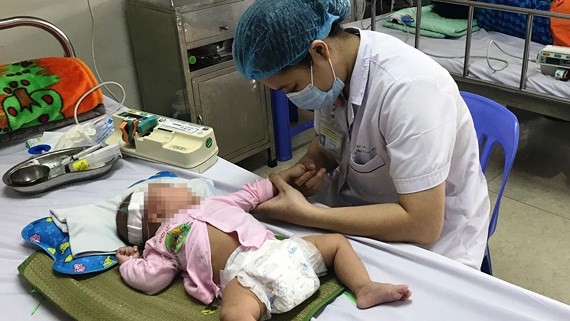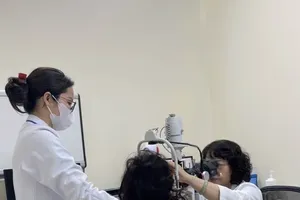
Many of them have been in critical condition; some have been unconscious while others have been suffering convulsion fits.
A mother of six-year-old kid from the northern province of Hai Duong hospitalized for the disease said that a few days ago, her child had mild fever, headache. Thinking that the kid had flu, she self-medicated him.
However, the child’s condition didn’t abate after three days taking drug but he had high fever and vomited; the family rushed him to the province infirmary for emergency treatment where doctor diagnosed that the kid was suffering Japanese encephalitis; accordingly, the kid was transferred to the National Children Hospital for further treatment.
National Children Hospital Deputy Director Dr. Tran Minh Dien said yearly, the hospital admits 300 - 500 cases. At present, the hospital is treating 30 kid patients suffering severe consequences. Worse, most of them were not vaccinated against the disease.
Most JEV infections are mild (fever and headache) or without apparent symptoms, but approximately 1 in 250 infections results in severe clinical illness. Severe disease is characterized by rapid onset of high fever, headache, neck stiffness, disorientation, coma, seizures, spastic paralysis and ultimately death.
The problem is that at first patients have symptoms like flu symptoms so many of them are hospitalized late. Accordingly, medical experts said parents should take their children to infirmaries for treatment when children have high fever, headache, neck stiffness and vomiting but not self-medication. More importantly, parents should take them to hospitals for vaccination as per schedule.
Vietnamese Ministry of Health has permitted Sanofi Pasteur –made vaccine Imojev to be circulated in Vietnam. The vaccine is for kids from one to two years old.
Currently, the S-shaped country is using two vaccines against Japanese encephalitis. One in the National Expanded Immunization Program is made by Vietnam.
Year-round Japanese encephalitis is mainly transmitted by the Culex tritaeniorhynchus mosquito, which is known to breed in rice fields, ponds and irrigation canals. The fatal disease primarily affects children; without timely treatment, children may be at risk of death or suffer serious neurological complications.
























